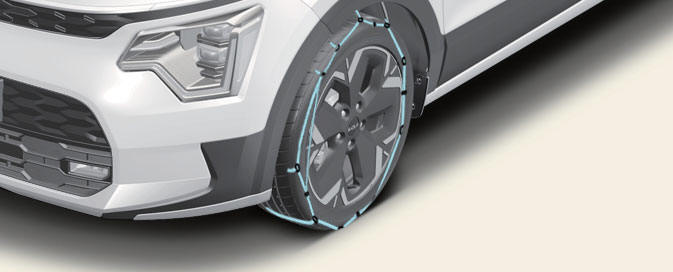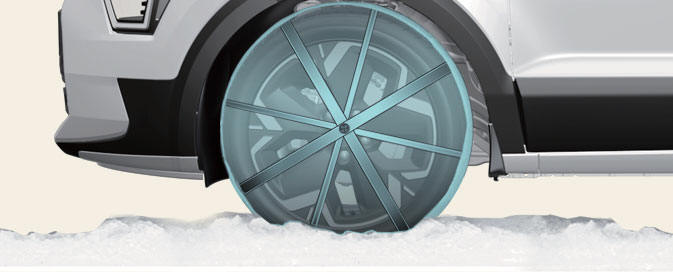KIA Niro: Tire chains (Kia Niro EV)

Normal type

Fabric type
Because the sidewalls of radial tires are thinner, they can be damaged by mounting some types of snow chains on them. Therefore, the use of snow tires is recommended instead of snow chains.
Do not mount tire chains on vehicles equipped with aluminum wheels; snow chains may cause damage to the wheels.
Damage to your vehicle caused by improper snow chain use is not covered by your vehicle manufacturer's warranty.
When using tire chains, attach them to the drive wheels as follows.
- Front wheel drive vehicle moves the front wheel as a power source. Thus, snow chains must be mounted to front tires.
- After mounting snow chains, drive slowly. If you hear noise caused by chains contacting the body, slow down until the noise stops and remove the chain as soon as you begin driving on cleared roads to prevent damage.
- Chains of the wrong size or which are improperly installed can damage your vehicle's brake lines, suspension, body, and wheels. Therefore, when installing snow chains, follow the manufacturer's instructions and mount them as tightly possible. Drive slowly with chains installed, staying under 30 km/h (20 mph).
- Install tire chains that meet the specifications of each tire size to prevent damage your vehicle.
- 17-inch tires use fabric snow chain.
CAUTION
- Make sure the snow chains are the
correct size and type for your tires.
Incorrect snow chains can cause damage to the vehicle body and suspension and may not be covered by your vehicle manufacturer warranty. Also, the snow chain connecting hooks may be damaged from contacting vehicle components causing the snow chains to come loose from the tire. Make sure the snow chains are SAE class "S" certified.
- Always check chain installation for proper mounting after driving approximately 0.5 to 1 km (0.3 to 0.6 miles) to ensure safe mounting. Retighten or remount the chains if they are loose.
Check the battery and cables
Winter places additional burden the battery system. Visually inspect the battery and cables as described in section 8.
Have the level of charge in your battery checked by a professional workshop. Kia recommends visiting an authorized Kia dealer/service partner.
To keep the locks from freezing
To keep the vehicle's locks from freezing, squirt an approved de-icer fluid or glycerine into the key openings. If a lock is covered with ice, squirt it with an approved de-icing fluid to remove the ice. If the lock is frozen internally, you may be able to thaw it out by using a heated key. Handle the heated key with care to avoid injury.
Use an approved window washer anti-freeze for the window washer system
To keep the water in the window washer system from freezing, add an approved window washer anti-freeze solution in accordance with instructions on the container.
Window washer anti-freeze is available from an authorized Kia dealer/ service partner and most auto parts outlets.
Do not use coolant or other types of anti-freeze as these may damage the paint finish.
Do not let your parking brake freeze
Under some conditions, your parking brake can freeze in the applied position.
This is most likely to happen when there is an accumulation of snow or ice around or near the rear brakes or if the brakes are wet. If there is risk of the parking brake freezing, temporarily apply it with the P (Park) gear position selected. Block the rear wheels in advance as well so that the vehicle cannot roll. Then, release the parking brake.
Do not let ice or snow accumulate underneath
Under some conditions, snow and ice can build up under the fenders and interfere with the steering. When driving in severe winter conditions where this may happen, you should periodically check underneath the vehicle to make sure the movements of the front wheels and the steering components are not obstructed.
Carry emergency equipment
Depending on the severity of the weather, you should carry appropriate emergency equipment. Some of the items you may want to carry include tire chains, tow straps or chains, flashlight, emergency flares, sand, shovel, jumper cables, window scraper, gloves, ground cloth, coveralls, blanket, etc.
Do not place objects or materials in the motor compartment
Putting objects or materials in the motor compartment may cause an motor failure.
Such damage will not be covered by the manufacturer's warranty.
READ NEXT:
 Trailer towing
Trailer towing
If you are considering towing with your
vehicle, you should first check with your
country's Department of Motor Vehicles
to determine their legal requirements.
Since laws vary the requirements for
towing trailers, cars, or other types of
 Hitches
Hitches
It's important to have the correct hitch
equipment. Crosswinds, large trucks
going by, and rough roads are a few reasons
why you'll need the right hitch.
Here are some rules to follow:
Do you have to make any holes in the
body of
 Driving with a trailer
Driving with a trailer
Towing a trailer requires a certain
amount of experience. Before setting
out for the open road, you must get to
know your trailer. Acquaint yourself with
the feel of handling and braking with the
added weight of the trailer. And always
keep in
SEE MORE:
 Forward Collision-Avoidance Assist operation
Forward Collision-Avoidance Assist operation
Basic function
The basic function for Forward Collision-
Avoidance Assist is warned and controlled
by the following level.
Collision warning
Emergency braking
Stopping vehicle and ending brake
control
Collision warning
A: Collisi
 Front Seat Back Cover
Front Seat Back Cover
Front seat back cover
Replacement
Remove the front seat assembly.
(Refer to Front Seat - "Front Seat Assembly")
Remove the front seat outer shield cover.
(Refer to Front Seat - "Front Seat Outer Shield Cover")
Categories
- Home
- KIA Niro EV, Hybrid - Second generation - (SG2) (2021-2024) - Owner's manual
- Kia Niro - First generation - (DE) (2017-2022) - Service and Repair Manual
- Contact Us
